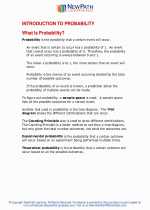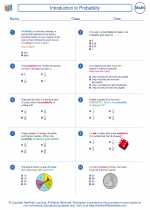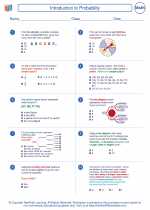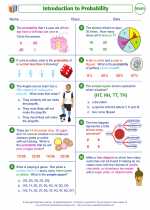Classical Probability
Classical probability is a concept in mathematics that deals with the likelihood of an event occurring based on the assumption that all outcomes are equally likely. It is used to analyze situations where the outcomes are well-defined and the sample space is finite.
Key Concepts
- Sample Space: The sample space is the set of all possible outcomes of an experiment. It is denoted by S.
- Event: An event is a subset of the sample space, representing a specific outcome or a combination of outcomes.
- Probability: The probability of an event A, denoted by P(A), is the likelihood of event A occurring. It is a number between 0 and 1, where 0 indicates impossibility and 1 indicates certainty.
Calculating Probability
The probability of an event A can be calculated using the following formula:
\[ P(A) = \frac{n(A)}{n(S)} \]Where n(A) is the number of favorable outcomes for event A, and n(S) is the total number of outcomes in the sample space.
Example
Suppose you have a standard deck of 52 playing cards. What is the probability of drawing a spade?
Sample Space (S) = {all 52 cards}
Favorable Outcomes (n(A)) = 13 (number of spades)
Using the probability formula:
\[ P(\text{drawing a spade}) = \frac{13}{52} = \frac{1}{4} \]So, the probability of drawing a spade from a standard deck of playing cards is \(\frac{1}{4}\) or 0.25.
Study Guide
To master the concept of classical probability, follow these study tips:
- Understand the sample space and how to determine all possible outcomes of an experiment.
- Practice identifying events and calculating the number of favorable outcomes for a given event.
- Learn to apply the probability formula to find the likelihood of specific events.
- Work on solving various probability problems involving classical probability, such as coin tosses, dice rolls, and card draws.
- Review and practice with sample problems to reinforce your understanding of classical probability.
By mastering classical probability, you will develop a strong foundation in probability theory and be better equipped to analyze and make predictions in real-world situations.
.◂Math Worksheets and Study Guides Seventh Grade. Introduction to Probability

 Worksheet/Answer key
Worksheet/Answer key
 Worksheet/Answer key
Worksheet/Answer key
 Worksheet/Answer key
Worksheet/Answer key
 Worksheet/Answer key
Worksheet/Answer key
